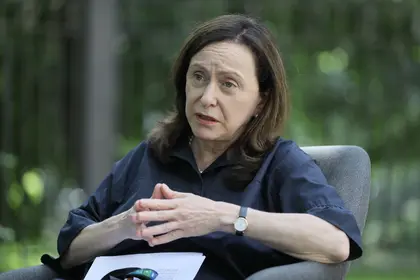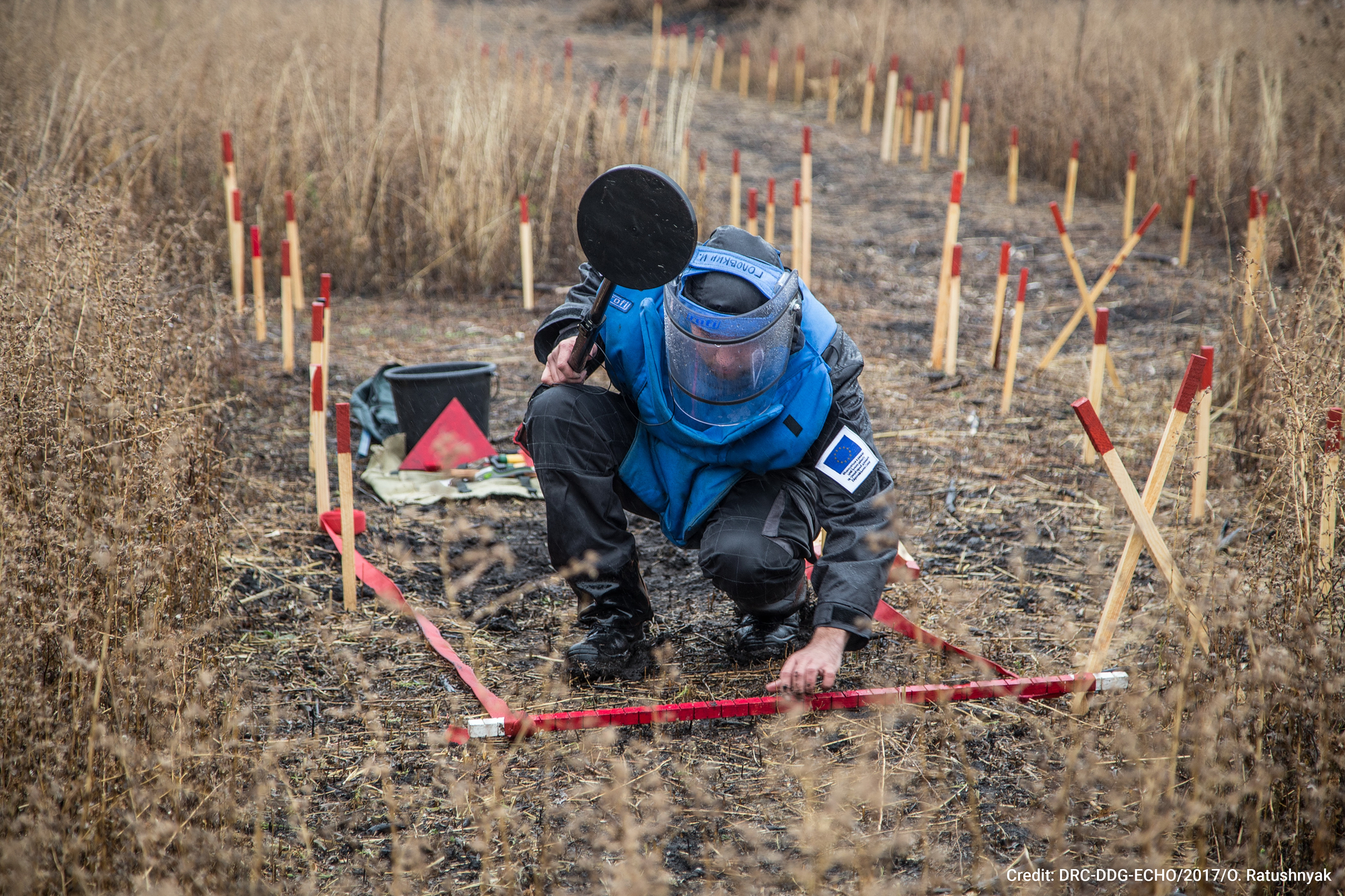The main United Nations compound in Ukraine, situated in central Kyiv, stands largely empty.
Only a skeleton crew of staff and security remains. Those who need to be at the office have to reserve a timeslot to use their workplace — a measure aimed at keeping the number of people in the building low and preventing the spread of COVID‑19.
JOIN US ON TELEGRAM
Follow our coverage of the war on the @Kyivpost_official.
It’s a strange new reality, but work continues, says Osnat Lubrani, the United Nations’ resident coordinator in Ukraine.
The Israeli-born American citizen came to Ukraine in 2018, bringing her extensive experience working in difficult places and under pressure — notably in Rwanda, the Republic of Congo, Macedonia and Kosovo.
But even for such an experienced veteran of the UN, these are unprecedented times. Now, her organization faces a double challenge: Helping prevent the spread of the virus while also assisting Ukraine to advance its reform goals and help its population.
“You can’t press a stop button” on reforms, Lubrani said. “I would encourage (Ukraine) to restart and to energize the process.”
Another day, another crisis
Despite the global pandemic, UN relief workers and experts are still hard at work helping the Ukrainian government, NGOs and civil society organizations to deal with what is only the latest crisis to strike Europe’s largest country.
In some ways, the 18-agency mission in Ukraine is bigger and busier than ever and the COVID‑19 pandemic is pushing its staff to deliver on its commitment to help Ukrainians improve their country, Lubrani said.
“For the UN, it all puts pressure on us to do better, to be more effective, to be more joined up and to be driven by the urgency,” she noted.
In her experience, a crisis can wake people up to problems that are being overlooked.
“Sometimes in a very unforeseen and bizarre way, crises can end up being an opportunity. I’ve seen that because of a crisis, there can be a sudden realization about things that have lingered and languished… and there is a realization about important things to deal with,” she said.
“Like health reform,” Lubrani continued. “All countries are realizing, to an extent, that certain things were being neglected.”
UN mission in Ukraine
Before moving to Ukraine, Lubrani was based in Fiji and responsible for nine small island states in Oceania. It wasn’t all island paradise living.
“We were dealing a lot with the issue of climate change, issues that almost threatened the viability of these nations, and dealing with humanitarian situations was more related to natural disasters,” she said. “Every year there was a cyclone or a hurricane that smashed one of the islands.”
Back then, she was involved in the process of introducing, agreeing and refining 17 so-called United Nations Sustainable Development Goals, or SDGs, which the UN says are the best plan to build a better world for people and our planet by 2030. The goals are intended to be a framework and call to action for all countries to promote prosperity while also protecting the environment.
Lubrani is committed to reaching those goals, even if Ukraine is in different circumstances than other countries where she has been assigned.
“Moving to Ukraine, which is a very large country with such a huge population, and its conflict in the east which is now into its seventh year… it’s so different, but there are lots of similarities in how the UN is conducting its work.”
Lubrani says that responding to the coronavirus outbreak has been a bit like trying to handle a natural disaster, akin to a viral tsunami. But the COVID‑19 pandemic is much more unprecedented and hard to respond to.
COVID‑19 coordination
Still, Lubrani’s experience in disaster relief is proving indispensable to Ukraine.
Whether it’s humanitarian relief in the war-torn eastern Donbas, where the UN allocates $162 million yearly on relief spending for 5.2 million affected people, or projects to tackle gender-based violence and discrimination throughout the country, or more recent WHO efforts to help the government during its nationwide coronavirus epidemic, the UN has a hand in almost everything.
“The work continues for the UN… and COVID‑19 is a huge challenge, it’s a crisis for every country, but the plan in Ukraine is to sustain and advance all of its development goals,” she said. All of the UN agencies have looked at their programs and budgets to determine how funds can be shifted to the COVID‑19 crisis, Lubrani says.
Savings on events and conferences can be funneled into direct relief efforts, she points out, and the World Health Organization has been boosted. But costs can increase too, Lubrani added, because staff also needs to be protected.
Since the start of the pandemic, the WHO has been working with the Ukrainian Health Ministry to develop its COVID‑19 action plan, Lubrani said, but the UN is prepared for a long confrontation with the virus that has killed at least 1,185 in Ukraine and 519,000 worldwide.
“Our mandate to help the Ukrainian government is already extremely diverse,” she said. She predicts that future UN programs in Ukraine are likely to include further responses to the COVID‑19 crisis and recovery, to make sure “people don’t fall through the cracks.”
Lubrani notes UN concerns, however, over how the country is reopening, and how Ukrainians may be starting to let their guard down. Infections are rising, and she was alarmed to see people flocking to beaches.
The UN also wants Ukrainians to be much more open to the idea of vaccinations, and Lubrani notes that there is still quite strong anti-vaccination sentiment in the country.
“Speaking for the WHO and UNICEF… this is a concern,” she said. “The vaccination rates are not where they need to be. And COVID‑19 is not an excuse to not get recommended vaccinations for your children.”
Accelerate health care reform
More broadly, the UN wants to see health care reforms and improvements accelerated. It is ready to help, but is also worried that needed reforms have stalled. “It needs to move forward. There has been progress in strengthening primary care.”
For Lubrani, fighting the virus is about saving lives, but, at the same time, her staff and their partners are trying to achieve broader UN development goals for the country.
She is passionate about pushing on with health sector reform, free and fair justice, and strengthening the social safety net for the most vulnerable in society.
Sustainable Development Goals
But the COVID‑19 pandemic has slowed progress on development goals. Where livelihoods and jobs in war-torn eastern Ukraine have been affected, the UN has moved to help as best it can.
“Even with lockdown lifted, many businesses have not been able to reopen and livelihoods have been lost,” Lubrani said, adding that transport challenges have been exacerbated by the pandemic. “Children have been denied access to learning, and more people are vulnerable to domestic violence. There is a correlation between increased levels of domestic violence and the quarantine lockdown.”
But sustainable development goals go beyond human rights and social justice. “It’s also about keeping the country stable, and jump-starting the economy too,” Lubrani said.
The UN says the human and environment-focused goals “recognize that ending poverty must go hand-in-hand with strategies that build economic growth and address a range of social needs including education, health, equality and job opportunities, while tackling climate change and working to preserve our ocean and forests.”
Lubrani recalls that getting the world to agree on these targets was incredible. “All of the countries of the world have, remarkably, come to a consensus around this sustainable development goals agenda, to reach by 2030, which they signed in 2015. It used to only be eight and it was only focused on the most poor countries, the millennium development goals. Now everyone realizes that even very rich countries need to address things like inequality and poverty.”
Justice and peace
While the UN supports the peace talks among Russia, Ukraine and Russian-backed forces in Minsk and the Normandy Four peace process, it is not involved in these talks because they’re too political by nature, Lubrani said. Her mission has to remain impartial in order to be effective.
Beyond the peace talks, access to free and fair justice inside the country is an area that requires much more attention, Lubrani says. “This is an area that is definitely lagging behind. The whole issue of the judiciary… and access to justice, needs more reform. There are many cases of impunity, where justice is not being delivered.”
And she emphasizes that the unreformed legal system affects every single area of UN work. Without proper courts and law enforcement, it is much more difficult to reach vital UN targets in juvenile justice, gender rights and free and fair access to the labor market, she says.
Lubrani also criticizes the concentration of wealth and power in the hands of oligarchs.
“Other people in Ukraine don’t have enough money to put food on the table. This is unacceptable in any country,” Lubrani said, adding that political will is needed to improve accountability, justice, rule of law and fair taxation.
Ukraine needs to continue “chipping away at systems that are at the heart of those inequalities,” Lubrani concluded.
You can also highlight the text and press Ctrl + Enter





